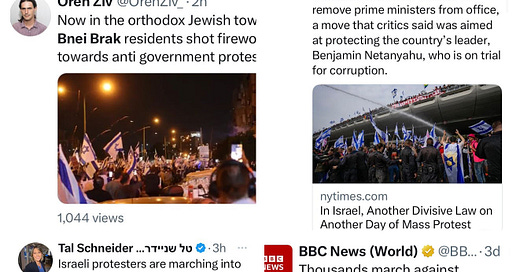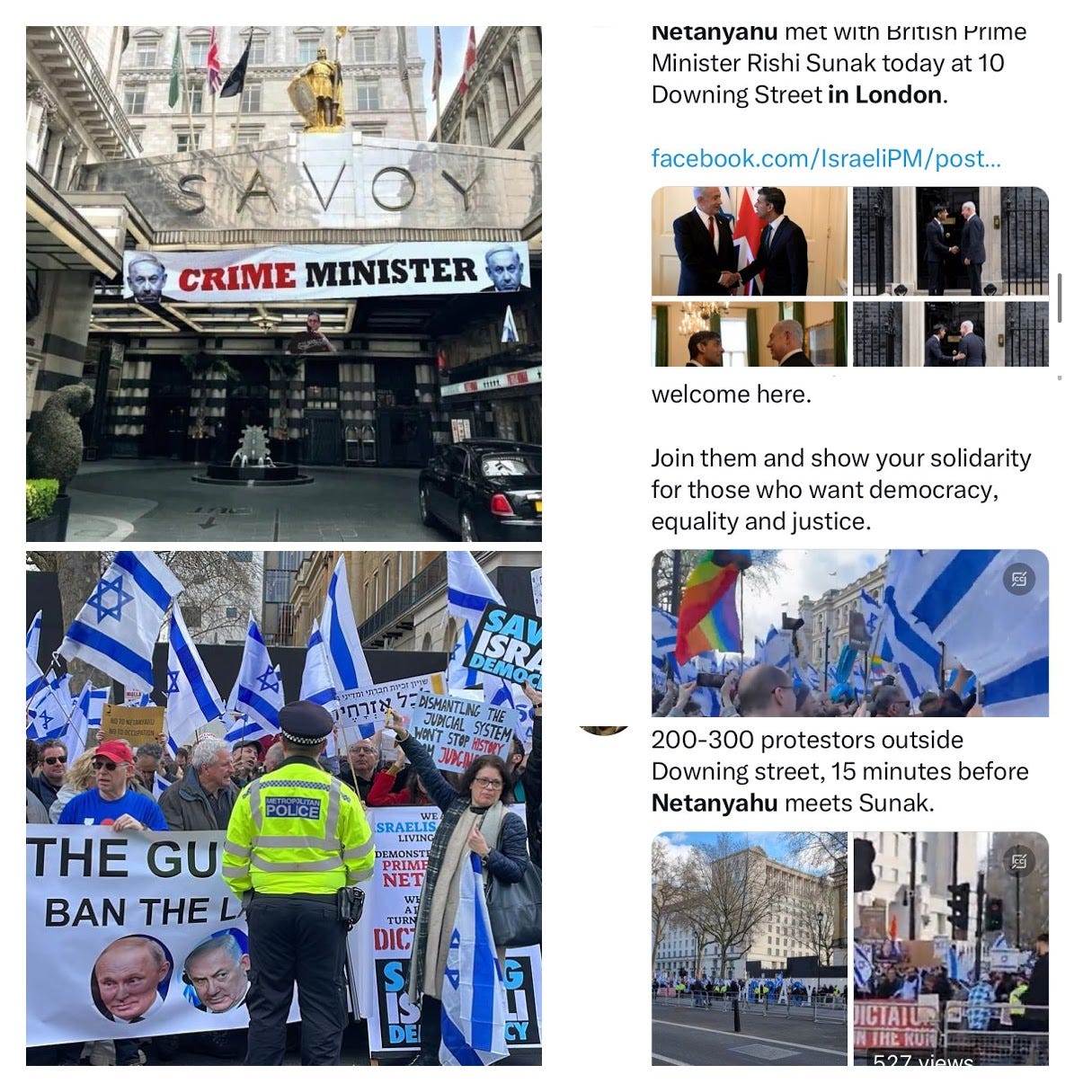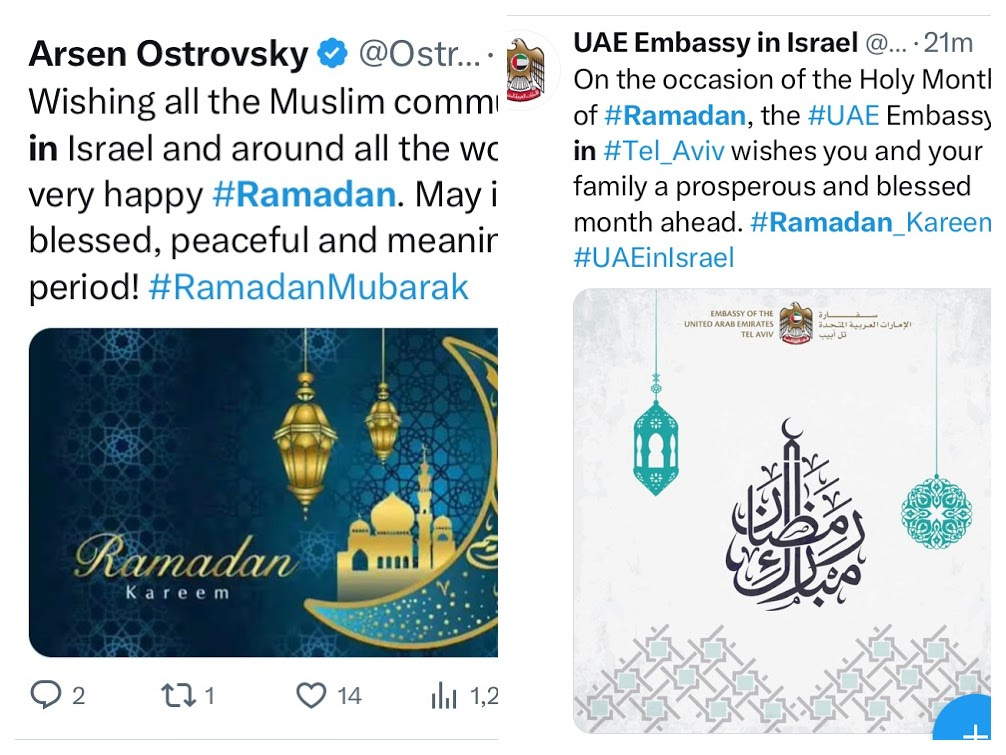Early Thursday Morning, Israeli Knesset Passed a Bill that Shields PM from a Court Ruling that Orders a PM to Take a Leave of Absence: This bill was tailored for PM Netanyahu, who, according to his current conflict of interest, cannot deal with any legislation that changes the judiciary system, while he stands trial. The Attorney General ordered PM Netanyahu not to take part in any discussion regarding the Judicial coup, and she is also evaluating if he should be asked to take a leave of absence while he stands trial as the legislative changes will influence his panel of justices in any appeal. The new bill enables forcing a PM to take a leave of absence only via a very challenging mechanism: if he decides to take a leave of absence, or if a super majority in the cabinet and a super majority in the Knesset (90 out of 120) vote for him to take a leave of absence. Thursday evening PM Netanyahu delivered a speech to the public. Expectations were that he would announce a pause to the legislation process. But PM Netanyahu did not do that, and instead announced that the process will proceed as planned. Following that speech, the Attorney General issued an official letter to the PM indicating that by taking a lead on the legislative process, he is violating the conflict of interest document he signed, and also violates a High Court ruling. Analysts indicate that this may turn into a constitutional conflict: which authority rules: the law, represented by the court or the executive power, represented by PM.
Meanwhile Demonstrations and Protests are Growing and Widening: Ministers and members of Knesset from the coalition face protests everywhere they go, even near their homes. Many cancel their attendance at public events, due to the rapidly growing protests. PM Netanyahu canceled his attendance at two events, others have also either cancelled or had to face protests, where hundreds of people carrying Israeli flags and shouting “DEMOCRACY” disrupt those events.
Hundred of Thousands of Israelis Participated in the “Day of Paralysis”, in Marches, Road Blocks, Civil Disruptions and Other Forms of Protest: One of the main events took place in the Ultra Orthodox Haredi town Bnei Brak, east of Tel Aviv. Many protesters marched in the streets of the Jewish Orthodox Haredi town. Representatives of the Haredi community in Israel (around 12% of the entire population and rapidly growing) are part of the coalition. From the founding of the state in 1948, they were exempted from the obligation of military conscription. Joining the IDF is mandatory for every Israeli eighteen year old, but the Haredi were exempt, if they attended a Yeshiva (a yeshiva is a traditional Jewish college or seminary, focused on the study of Rabbinic literature, primarily the Talmud and halacha (Jewish law)). Furthermore, they receive a living allowance from the state. Over the years their numbers have grown rapidly due to the high birth rate of 6.6 children for Haredi women. Citizens who are conscripted to the IDF and further serve in reserves are no longer willing to agree to this arrangement. On the other side, the leaders of the Haredi community are eager to gain more advantages. The rift between the Haredi and the liberal camps in Israel is deepening, and is now a major part of the protest. The Haredi Knesset members are pushing hard to pass the overhaul bill.
The Israeli Knesset Passed a Bill that Repeals the 2005 Disengagement Law for the Northern West Bank: Rightwing coalition in Israel passed a law that practically re-annex’s an area in northern West Bank, that was evacuated during the disengagement back in 2005. The disengagement included evacuating all settlements in Gaza and four in the Northern West Bank. Settlers have attempted over the years to reverse the governments act of evacuating those settlements. A Yeshiva (A Jewish religious seminary for men) was established in one of the evacuated settlement, Homesh, and Jewish religious students used to go there, escorted by military forces, all against the law. Now it will be legal.
This decision generated a dramatic reaction from the USA. In Washington DC, the Israeli ambassador was urgently summoned to the State Department, where he was asked to explain the new law. This is a rare act from Israel’s strongest and closest ally. Relations between Israel and the US have slowly deteriorated in the last few months since the new coalition government was sworn-in. PM Netanyahu has not been invited to the White House, as is customary for a new PM, and President Biden scolded PM Netanyahu during a phone call.
The Jordanian parliament voted to expel the Israeli ambassador from Jordan, the European Union also expressed negative reactions to the new law.
PM Netanyahu was forced to come out and promise the world that Israel does not intend to rebuild the evacuated settlements. Meanwhile a minister in his cabinet, Orit Strook, the Minister for National Missions stated in an interview that with Gods help, even the Gaza settlements will be rebuilt, because Gaza is part of the promised land.
In Paris, Betzalel Smotrich Caused Yet Another Diplomatic Crisis, Stating “the Palestinian people are an invention of less than 100 years ago”: a week after his widely condemned statement that the Palestinian village of Huwara should be “wiped out”, Minister of Finance Smotrich caused the diplomatic crisis by claiming that there is no such thing as a Palestinian people.
Smotrich made this statement at a meeting in Paris with Jewish community leaders, with a map of “greater Israel”, Jordan included, in the background.
Smotrich said “Is there a Palestinian history or culture? No. There were Arabs in the Middle East who arrived in the Land of Israel at the same time as the Jewish immigration and the beginning of Zionism. After 2,000 years of exile, the people of Israel were returning home, and there were Arabs around [us] who do not like it. So what do they do? They invent a fictitious people in the Land of Israel and claim fictitious rights in the Land of Israel just to fight the Zionist movement,”.
The statement was met with widespread condemnations from Saudi Arabia, the UAE, Qatar, France and the US. Jordan issued a grave condemnation and summoned the Israeli ambassador. The Jordanian parliament voted in favor of expelling the Israeli Ambassador. To minimize damages, Israel issued a statement that it respects Amman’s territorial integrity.
State Department spokesman Vedant Patel called Smotrich’s statement “offensive” and told reporters, “We found those comments to not only be inaccurate but also deeply concerning and dangerous.” The Israeli ambassador to the US, Mike Herzog, was summoned to Washington over Smotrich’s statement.
Netanyahu Travels to London Amidst Heightened Turmoil Over Judicial Overhaul: Prime Minister Benjamin Netanyahu and his wife took off early Friday morning for a weekend in London, where Netanyahu is scheduled to meet with his British counterpart, Rishi Sunak. This is Netanyahu’s fourth visit to a European capital in recent weeks, after visits to Paris, Rome and Berlin. According to the media, the two leaders will discuss Iran’s accelerated nuclear armament. The meeting is taking place in the shadow of rising concerns among European leaders over the Netanyahu governments’ judicial overhaul and the cancellation of the disengagement law in the West Bank.
Ahead of the visit, more than 1000 Israeli artists, writers and film directors wrote an open letter to PM Sunak, urging him not to receive PM Netanyahu at 10 Downing Street.
Except for the meeting with British premier Sunak, Netanyahu’s schedule in London is quite empty, and he has no meetings scheduled with Jewish communal leaders.
Criticism of the Netanyahu government has been on the rise in the UK, over the planned judicial overhaul, as well as highly provocative statements made by minister Smotrich. Ahead of Netanyahu’s visit, criticism was publicly voiced by leaders of parties and organizations traditionally supportive of Israel. The chair of the foreign affairs select committee, Alicia Kearns, for one, concerned over the risk of a third intifada, said she was not sure that Netanyahu coming to Britain now was a wise move.
UK Chief Rabbi Ephraim Mirvis, in a column in the Jewish Chronicle called for “Jewish unity”. Concerned by the possibility of a civil war over the judicial overhaul, Mirvis called on Israel to “hold fast to the principles upon which it was founded: respect and dignity for all of its people, regardless of their background or political leanings.”Hundreds of people demonstrated in front of 10 Downing St. during Netanyahu’s meeting with PM Sunak. Upon arrival at the Savoy hotel, Netanyahu was “greeted” by a huge “Crime minister” banner hanging just above the hotel sign.
According to Israeli media, in light of the criticism and protests, the British PM and Netanyahu did not make a joint statement at the conclusion of their meeting.During Month of Ramadan, Concerns Over Escalation in Violence Increase: As preparations for Ramadan reach their peak, with bakeries and sweetshops preparing traditional sweets and colorful decorations in the streets, security officials voice concerns over an escalation of violence.
The holy month of Ramadan, observed by Muslims around the world, commenced on Thursday. Ramadan is marked by prayers and fasting during the day, and festive meals and outings after sunset.
This holy month is also marked by rising tensions in East Jerusalem, the West Bank and Gaza, and police and security officials are making an effort to ease the tensions and attempt to maintain a relative calm.
According to human rights groups, the first quarter of 2023 was the deadliest in twenty years. At least 88 Palestinians, and sixteen Israelis were killed since the beginning of the year in violent clashes in the West Bank and inside Israel. Security officials have long warned of a third Intifada, in light of the steady escalation in violence and bloodshed.
Hence, efforts are underway to decrease tensions during the month of Ramadan. Israel will ease Palestinians’ entry to Jerusalem ahead of Ramadan; women, children, and men over 55 from West Bank will be able to take part in Friday prayers at Al-Aqsa Mosque without permits. According to the media, some Gazans will also be allowed into Israel during the week. Also, the Israeli Prison Service reached an agreement with the Palestinian prisoners’ leadership to postpone a hunger strike until after Ramadan. The hunger strike was announced in response to Minister of National Security Ben-Gvir’s intentions to impose harsher imprisonment conditions in security wards.
Further Reading
Disengagement: Here, here, here, here
Smotrich: Here, here, here, here, here
Discussion about this post
No posts










